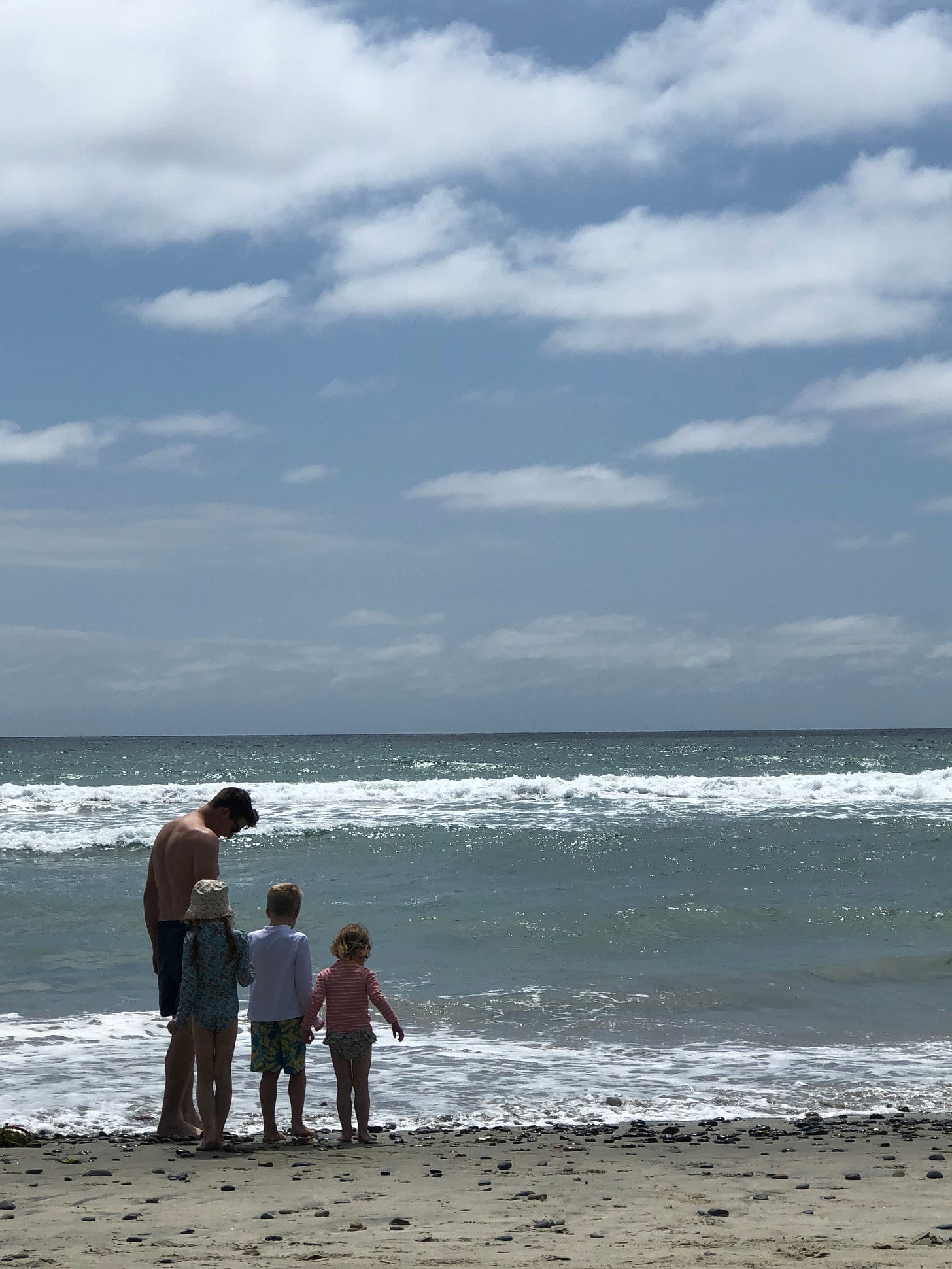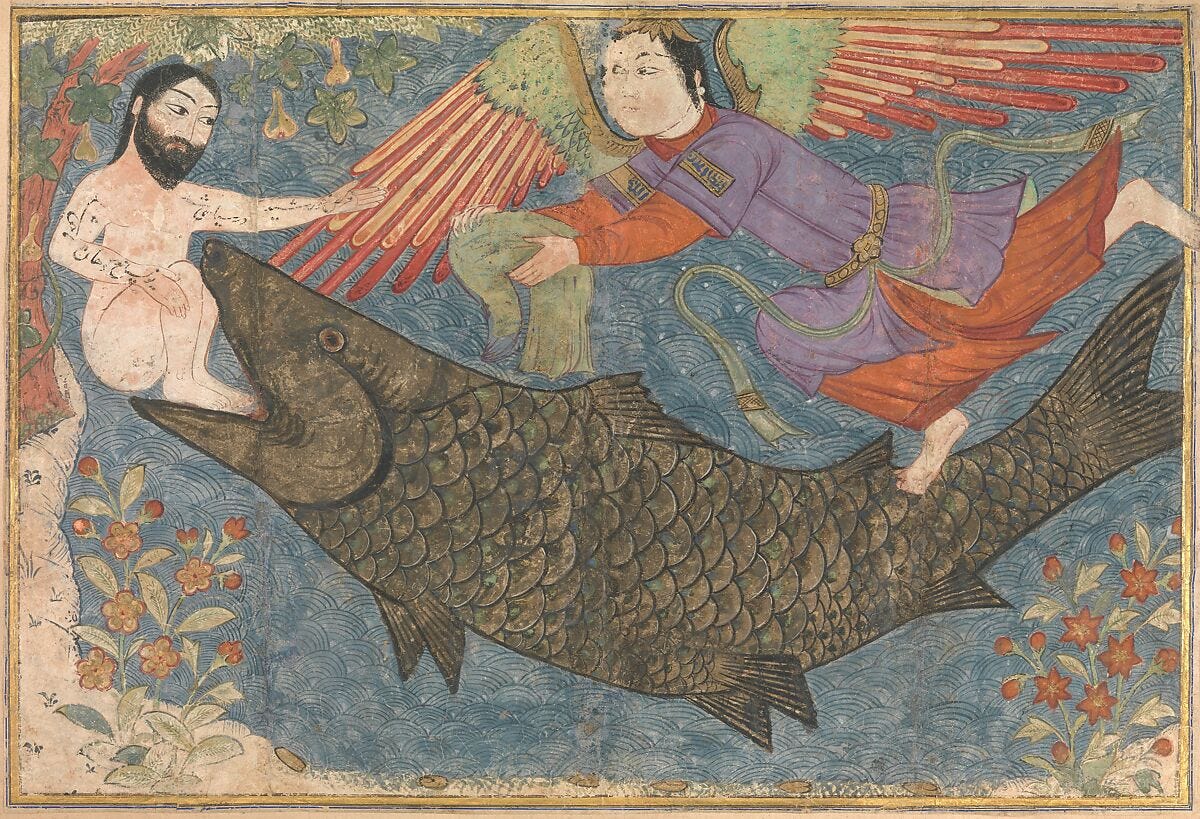Dear friend,
Last week we took our first-ever family vacation with the five of us. Road tripping from Colorado to California and back, with three kids, one of whom is barely potty-trained, was a riotous romp—joy and a minor amount of misery.

Encountering the ocean feels like a brush with the divine. Obviously, I am far from the first to feel this way. As I gazed at the Pacific, thousands and thousands of miles away and hundreds of years distant from medieval Europe, snatches of medieval verse and prose ran through my head.
I thought about the fantastical ocean language in the fourteenth-century anonymous Middle English poem Patience, written by the poet of Pearl and Sir Gawain and the Green Knight. This alliterative poem is an imaginative retelling of the Book of Jonah. Read on for the poet’s version of Jonah being swallowed by the whale. The sparkling but difficult dialect of Middle English is at the top, my translation follows:
Lorde, colde watz his cumfort, and his care huge, For he knew vche a cace and kark that hym lymped, How fro the bot into the blober watz with a best lachched, And thrwe in at hit throte withouten thret more, As mote in at a munster dor, so mukel were his chawlez. He glydes in by the giles thurgh glaym ande glette, Relande in by a rop, a rode that hym thoght, Ay hele ouer hed hourlande aboute, Til he blunt in a blok as brod as a halle; And ther he festnes the fete and fathmez aboute, And stod vp in his stomak that stank as the devil. ...And thenne he lurks and laytes where watz le best, In vche a non of his nauel, bot nowhere he fyndez Ne rest ne recouerer, bot ramel ande myre, In which gut so euer he got, bot euer is God swete... Lord, cold was his comfort, and his cares great For he knew every misfortune and trouble that fell on him, How in going from the boat to the bubbling water he was snatched by a beast, And went through its throat without force, As a speck of dust through a cathedral door, so great were its jaws. He glided in by the gills, through slime and filth, As if he was being reeled in by a rope, or perhaps on a road, All heel over head he was hurled about, Til he stopped in a space as broad as a hall; And there he makes firm his feet and gropes about, And stood up in the stomach that stank like the devil. ...Then he lurks and seeks where was best In each nook of its navel, but nowhere he finds Rest or recovery, just muck and mire, In this gut wherever he goes, but always is God sweet... (ll.264-280)
At this moment, Jonah calls out to God after fleeing from him. “You are God!” And demands to be saved: “Have now mercy of Your man and his misdeeds / And prove you are truly Lord of land and water.”

Medieval Christians saw Jonah as a “type” of Christ. Typology is an ancient way of seeing Christ around every corner when reading the Old Testament, dating back to Paul’s description of Adam as a type of Christ. These people and their life events prefigure the coming of Jesus. For instance, Jonah was seen as a type of Christ because he was swallowed by the whale and survived it, becoming a forerunner of Christ’s death, descent into Hell, and resurrection. Our poet has a lot of fun with this way of reading Jonah. Jonah descends into a malodorous, slimy Hell (Hell was traditionally very smelly in medieval tradition) as he dwells in the belly of the whale. But don’t miss the astounding simile that precedes this fishy inferno: He glides effortlessly through the fish’s maw like “mote in at munster dor,” as a mote or speck of dust through a minster door. I can immediately imagine the massive oaken doors open and the dust dances, briefly illuminated in daylight before being sucked into the dark and massive carved whale-bone innards of the great medieval cathedrals.
And we understand Jonah as not only a type of Christ, but of ourselves. Very often, we too are the dust at church-door, trying to escape stinky hells wrought of our disobediences large and small, yet we remain in the hand and house of God, awaiting resurrection. “Have mercy, prove yourself Lord of Land and Water…” The belly is both minster and deeply uncomfortable navel nook of Leviathan.
Medieval folks understood the story of Jonah to resonate with Psalm 139:7-10.
Whither shall I go from thy spirit? Or whither shall I flee from thy face? If I ascend up into heaven, thou art there; if I make my bed in hell, behold, thou art there. If I take the wings of the morning, and dwell in the uttermost parts of the sea; Even there shall thy hand lead me, and thy right hand shall hold me. (KJV)
It is this psalm that the fourteenth-century Julian of Norwich, my favorite medieval writer, is meditating upon as she writes of her mind being led to the bottom of the sea, yet never leaving the presence of God:
One time my understanding was led down into the sea ground, and there saw I hills and dales green, seeming, as it were, overgrown with moss, with debris and gravel. Then I understood thus: that if a man or a woman were there, under that broad water, there he might have sight of God—as God is with a man continually—he should be safe in soul and body, and take no harm. (10.16-20)
In our age of submarines and underwater cameras, many of us have seen a sea floor. But in Julian’s age, no one would have, unless the water was rather shallow or otherworldly clear. True deepness was like death itself. Who could see it and come back from it? Julian, in the midst of her illness, sees it well: God is in the deep itself, in the places of death and darkness, in the crushing pressure and cold where it seems no one can live.
But as I looked at the ocean, there was one line that danced most in my own mind. When the wretched personification of Avarice in the great fourteenth-century allegorical poem Piers Plowman is overcome with despair by the enormity of his sins and debts, the figure of Repentance counsels him:
And al the wikkednesse in this worlde that a man myghte worche or thynke Ne is no more to the mercye of God than amyd the see a glede. And all the wickedness in the world that a man might work or think Is no more to the mercy of God than a live coal in the sea. (B.V.281-283)
The last two lines have haunted me now for a long time (and seem to have haunted one of my favorite authors, Madeleine L’Engle, also). I stand with my feet in the bright cold seawater and think about and hope for the total impotence of sin at the end of all things—my own sin and the common, systemic, devastating sins that afflict the world. O Lord, quench it with the heavy weight of your justice and compassion.
This made me think of St. Catherine of Siena’s simile on the relationship between Christ and the Christian upon the Christian’s reception of the Eucharist. From The Dialogue:
Just as the fish is in the sea and the sea in the fish, so am I [Christ] in the soul and the soul is in me, the sea of peace.
The fish is in the sea is an ordinary clause. We are quite used to thinking of ourselves as overwhelmed in the sea of God’s love. There are multiple good and cheesy worship songs about oceans of love. But The sea is in the fish immediately stands out in its strangeness. As the Eucharist enters the body, so the sea blessedly runs through and out a fish’s gills as life. The whole ocean sustains the fish from within and without. For the fish, its as if the whole universe, the very material one moves in and consists of, is in one’s body. It is all seawater as sustenance, as love. For us, Catherine insists, it is the same. We live and breathe and eat God, our bodies and souls overflow with him.
I hope some of these watery medieval words can run through your head if you have the chance to stand with your toes in the ocean sometime soon.
What I’ve been up to this month:
Messing around with a new writing project. Haven’t gotten much done due to end of school mayhem with the kids and our family travel. But it’s at that delightful stage of writing, where you feel like you could create anything, and the constraints of your own limitations has not hit you yet!
Season three of Old Books with Grace ended with a lovely conversation on St. Augustine of Hippo and the virtue of hope with Dr. Michael Lamb, author of A Commonwealth of Hope: Augustine’s Political Thought. The podcast will resume in the fall!
Putting final proofing touches on my book, Jesus through Medieval Eyes: Beholding Christ with the Artists, Mystics, and Theologians of the Middle Ages. It’s now available for preorder (Amazon, B&N, Christianbook.com where it is inexplicably cheaper, or check your favorite local bookstore)!
What I’ve been reading this month:
Fiction: Circe by Madeline Miller. Couldn’t put it down.
Nonfiction: Loads of Alasdair MacIntyre & virtue ethics fun.
Medieval/medieval-adjacent: Very slowly rereading C.S. Lewis’s hefty volume English Literature in the Sixteenth Century. Laugh-out-loud funny at times.
Article: My good friend Jack Bell over at
published a delightful piece in Plough Quarterly on the 19th-century radical farmer and writer William Cobbett and his efforts against enclosure (the odd yet iconic duo of Chesterton and Marx were both fans of Cobbett’s Rural Rides!).
A Prayer from the Past
It is the time of year for travel, so here is a journey prayer for you, taken from the beautiful Gadelica Carmina collection of prayers and hymns collected in the Highlands and islands of 19th-century Scotland by Alexander Carmichael.
God be with thee in every pass, Jesus be with thee on every hill, Spirit be with thee on every stream, Headland and ride and lawn; Each sea and land, each moor and meadow, Each lying down, each rising up, In the trough of the waves, on the crest of the billows, Each step of the journey thou goest. Amen.
Peace for your June,
Grace
P.S. As always, Medievalish is free, and I’d be delighted if you shared it with a friend!




Middle English. Be still my heart! Such a wonder. Imagine - English before spelling was invented.
Marvellous piece.
Be more medieval.
I'm so glad that I've found your writing, Grace. I look forward to devouring it in the future, like a fish consuming a certain biblical prophet.
The use of alliteration in Old English poetry is really just the best.